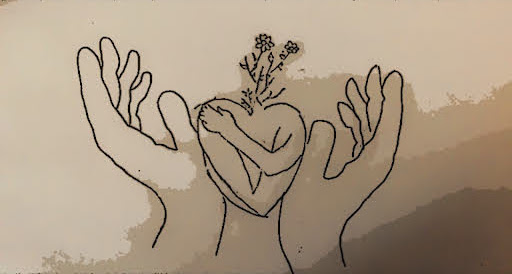Cultivating Self Acceptance, Not Love of Self

A heart hugging itself that is growing to recognize self-value in human hands. Self-love will only develop if it is driven by our support.
February 14, 2022
You’re contentedly scrolling through your Instagram feed, admiring the art and self-expression until you come across one post—an advertisement of an exercise app that promotes the “perfect body”: slim, hourglass shapes with exuberant curves and toned, broad shoulders with visible muscles. You don’t think much of it; after all, this is just a silly advertisement for some Instagram accounts to make money.
You continue scrolling. Everything seems to be targeted towards your flaws now–– social media influencers posting about their insecurity about their perfect body, celebrities promoting love of self in a picture of them on a yacht, encouragement posts on gratitude for everything you have. It’s all too much, and you end up throwing your phone across the room.
This is the reality of a pressing issue teenagers face today. Social media has contributed to many societal pressures pertaining to body image, personality, and even hobbies. Everyone seems to judge you, and you’re constantly reminded of this scrutiny through the internet.
Enter the love of self movement. Over the years, love of self has been associated with conflicting values. From vanity and selfishness to well-intentioned encouragement to nuanced toxicity, love of self is constantly promoted. Many people agree with its importance. However, social media influencers often preach “self-love” while constantly flaunting their utopian lives, exposing the insecurities of many of their followers.
Senior Alexis Kustka ‘22 states why they believe love of self has developed notes of virulence: “Growing up, love of self had a very negative connotation. I think this was in part due to the portrayal of selflessness in shows.” Oftentimes, the media portrays shyer characters as self-conscious protagonists, whereas those who are confident were deemed arrogant and obnoxious.
“Rewriting this narrative is what helped me gain self-love. Acknowledging the damage this had on how I viewed confidence, I was able to overcome that and learn to congratulate myself when I felt confident,” Kustka adds.
Kustka defines love of self as “beyond just accepting who you are. It’s being able to hear the world actively against you and still believe in yourself. Believe that what you are doing is good, and that you are good, even if people don’t support you.”
Rather than seeing love of self as arrogant, Kustka interprets love of self as appreciation. You do not need to be perfectly put together to begin loving yourself, and your love of self isn’t an outward reflection of your self worth or another person’s capacity to love you.
As our generation has experienced a digital transformation, the love of self movement has transformed into a more nuanced version: self-acceptance. Defined as the acknowledgement and the acceptance of flaws rather than pretending to love and embrace them, self-acceptance has replaced the idea of unconditional love.
Ali Ahmed ‘22 recalls the influence failure and academics has had on his perception of self-acceptance: “Throughout my time in high school, I learned that self-acceptance remains an important part of your life in general. I learned that success doesn’t come easy; for every success, you might have two, three, ten, twenty, hundred failures.”
Without a doubt, feelings of alienation and frustration that social media and society has ingrained within the minds of young adults are shared by many. Oftentimes, various cultures and ethnic backgrounds play an immense role in love of self and confidence. Students face immense pressure from academics, which is further influenced by their culture, causing an endless cycle of stress or even self-hatred depending on grades or academic success.
Sneha Rajagopalan ‘23, a student at the Edison High School STEM Academy, notes the cultural obligation to succeed in academics. “I think one of the biggest things about being brown is the fact that we have to excel academically, and that puts extra pressure on me to maintain really good grades. Being Indian forces me to feel the need to be perfect and get the highest grades in subjects like math, which always stresses me out. Then, I’m in this cycle of self-hatred because I can’t get the grade I want and that pressure has always been there,” Rajagopalan said.
The road to acceptance is not as easy as a simple self-care day or having a social-media detox. It is common to fail and experience doubts and frustrations. Yet, a distinction to make in our mentality is to focus on the growth, not the failure itself. Accepting yourself despite your flaws and failures, regarding yourself as a strong individual who can grow and learn from your hardships is crucial.
“As cliche as it might sound, failures don’t define anyone, and it certainly doesn’t define me,” Ahmed expresses. “These failures all serve as learning opportunities, as reminders to get up and try again.”

























































































